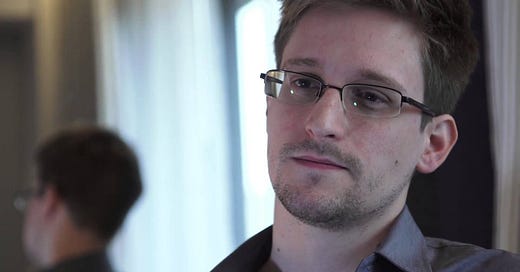The Snowden Files Ten Years Later
Glenn Greenwald was heralded as a progressive hero for his reporting, but the reality is that he was always a terrible journalist.
by Bob Cesca
WASHINGTON, DC – On June 6, 2013, Glenn Greenwald published an article for The Guardian about how the National Security Agency (NSA) was collecting phone call metadata from Verizon customers. The story was derived from PowerPoint slides stolen from NSA by Edward Snowden and the reporting about those slides launched a Summer-long saga that involved some of the worst journalism I’ve ever read. And that’s just for starters.
To say that I was obsessed with this story is a gross understatement. I went on to cover the coverage of the Snowden files for The Daily Banter throughout the subsequent six months, writing about little else. I was perpetually astonished not just by the crappy journalism produced by Greenwald and others, but also by how the news media, members of Congress, and political junkies alike were so easily misled by the aforementioned crappy journalism and the calculated deceptions of its authors.
It seemed like there were new bombshell articles being published nearly every day, mainly by Greenwald in the pages of The Guardian and eventually in Pierre Omidyar’s startup publication The Intercept, about how the government was spying on everyone and everything. As I and a handful of others reviewed these stories, it was clear to us that the reporters were casually shaving the corners of the truth, much of which had already been published in books by authors like James Bamford, while also flagrantly burying mitigating information deep inside their news copy where few readers would see it.
One of the very first examples of buried information was in Greenwald’s June 6 piece about Verizon. Glenn painted a picture in which NSA was accessing this metadata (the phone number making a call, the number receiving a call, plus time and date) without any oversight – violating constitutional privacy protections. It wasn’t until paragraph 14 when Greenwald finally mentioned that NSA required warrants issued by the Foreign Intelligence Surveillance Court (FISC) to access the metadata. In other words, NSA wasn’t spying on anyone without probable cause and a court warrant.
The very next day, Greenwald published a second piece about NSA’s “PRISM” system, making it seem as though NSA had “direct access” to servers and customer data from Apple, Google, and other digital platforms. Statements by the tech companies strongly denied that the government had infiltrated the privately-owned servers.
TechCrunch's Josh Constine reported, "[T]he NSA did not have direct access or any special instant access to data or servers at the PRISM targets, but instead had to send requests to the companies for the data." This obviously rendered the “direct access” allegation to be a gross error, which is the nicest way to describe it.
Before he emerged publicly, Snowden told The Washington Post that week: "[NSA] quite literally can watch your ideas form as you type." That’d be impossible without a warrant or direct access, not to mention the assistance of Professor Xavier.
And that’s how the NSA story began, only to devolve as the Summer wore on.
Over the subsequent months, facts were buried under an avalanche of outrage. It seemed lost on everyone that NSA is tasked with foreign surveillance. And in spite of retaining our metadata on its massive servers, NSA only accessed data from US persons via FISC warrants showing probable cause that those persons were in contact with overseas targets. NSA wasn’t listening to the calls of just anyone – after all, why would it waste time on your call to your Mom about her frozen shoulder or your phone sex call with your boyfriend or girlfriend?
Greenwald and others clearly wanted their readers to believe such things were happening, and so they sculpted their reporting to give that impression. Studies of online reading habits showed that few people read more than a headline, even fewer read the lead paragraph, and almost no one reads 14 paragraphs into a piece. Convenient, isn’t it, if you’re looking to manipulate how the public digests your reporting.
One of the most egregious chapters in the saga occurred when Alan Rusbridger, the editor of The Guardian at the time, wrote an op/ed about David Miranda, Greenwald’s late husband, who was detained and questioned by British authorities after acting as a courier for thumbdrives containing the Snowden files. About 12 paragraphs into the article, Rusbridger wrote that the British equivalent of NSA, known as the GCHQ, raided the publication’s London newsroom and forced the staff to destroy the computers holding The Guardian’s copies of the Snowden files:
And so one of the more bizarre moments in the Guardian's long history occurred – with two GCHQ security experts overseeing the destruction of hard drives in the Guardian's basement just to make sure there was nothing in the mangled bits of metal which could possibly be of any interest to passing Chinese agents.
He went on to write that the destroyed computers were Macbooks. But when he posted photos of the allegedly destroyed Macbooks, it was obvious that the computer parts were from an old PC from the mid-1990s, and not Macbooks. Not only was this seemingly stand-alone revelation buried in the middle of an op/ed about a different topic (Miranda), but the details rapidly exposed an obvious lie. We later learned that the destruction of the not-Macbooks was voluntary, and to this day, it’s unclear whether any of the GCHQ story was true.
Everybody wanted a piece of the action. The Snowden saga made for such compelling reading that every article was a viral hit, hence there was an ongoing race to see who could break the next big thing. In the process of that clickbait battle, the facts and, with them, journalistic integrity was jettisoned.
During the winter of 2014, The Guardian’s Luke Harding wrote an astonishingly ridiculous article in which he claimed NSA was deleting the text of his work-in-progress book while he typed it.
The paragraph I had just written began to self-delete. The cursor moved rapidly from the left, gobbling text. I watched my words vanish. When I tried to close my OpenOffice file the keyboard began flashing and bleeping.
Uh-huh. An obvious computer malfunction was inflated into NSA agents deleting his book. Almost from the beginning, the reporting read more like paranoid fan fiction than actual journalism. In the same piece, Harding was speculating about bumping into shady characters he assumed were CIA agents, which, if true, would be shocking, but how were we expected to accept the word of a reporter who was obviously embellishing for dramatic effect? In 2016, Oliver Stone released a movie about Snowden based on Harding’s book – the one NSA was allegedly trying to delete.
I also learned at the time that many of these same websites were infested with cookies and trackers that collected much more information about readers than NSA ever did. And that’s one of the long term takeaways from what happened 10 years ago. Today, we don’t even blink at the notion of corporate spying. TikTok, one of the most popular social media platforms and owned by a tech company in China, collects massive amounts of data from its users in the U.S. and has been accused of sharing that data with the Chinese government. I wonder how many TikTok users were rending their garments over the Snowden files?
Greenwald, meanwhile, has become a regular on Fox News where he’s an unrelenting defender of Vladimir Putin and, because of it, has been ostracized by Normals. But in 2013, he was mis-categorized as a champion of progressivism. My articles about his agenda-driven reporting drove many liberals to abandon my podcast and to label me as a shill for the national security state. Yet in the years following the Summer of Snowden, I feel as though my assessment of Greenwald has been vindicated.
As for Snowden himself, the former NSA contractor not only remains a guest of Vladimir Putin, but he’s now a Russian citizen. During the early Spring of 2013, Snowden fled to Hong Kong where he eventually celebrated his birthday at the Russian consulate. After that, he was escorted by Wikileaks attorneys to Moscow where he retained the services of Anatoly Kucherena, a lawyer for the FSB, formerly known as the KGB.
During the following year, 2014, Putin invaded and annexed Crimea. In 2015 and 2016, the Russian operation to elect Donald Trump began when the Russian military intelligence agency known as the GRU hacked the DNC, the DCCC, and Hillary Clinton campaign officials, and then published the information via Guccifer 2.0 and Wikileaks. This was followed by the unprecedented social media disinformation campaign that ended up electing Trump without a popular vote victory.
While the Department of Justice began its Crossfire Hurricane investigation into the Trump-Russia scandal, Putin continued his attack on western democracies with disinformation campaigns promoting Brexit and far-right authoritarians like France’s Marine Le Pen. And finally, in 2021, Putin invaded Ukraine again, committing unspeakable human atrocities in the process.
I believe Greenwald, Snowden, and their enablers were unwitting participants – useful idiots – in Putin’s attempted digital manipulation of the U.S., not to mention its allies.
The point of weaponizing Snowden and his documents, along with the operations that followed, was to divide the American public, to elect a compliant and easily manipulated dummy, Trump, to the White House, to weaken NATO, to elevate authoritarian puppets, and to cripple intelligence alliances so that when Putin proceeded with his military expansionism into Ukraine and theoretically the rest of eastern Europe, any outside resistance would be minimized. Fortunately, he mostly failed. Resistance from the U.S. and its allies has been strong, even though sentiment among American citizens is more divided than it’s been since the Civil War.
And it all started with Edward and the gullible people who granted him with hero status.
I’d like to think we’ve grown wiser since the Snowden files debacle, and especially since the near-democracy ending disaster of 2016 that followed it. Many of us have. But now, chaos agents like Elon Musk and his cozy relationship with Putin, have seized the controls of our social media again, elevating disinformation, duping millions of suckers, and pursuing bogus agendas – all coinciding with Trump’s next stab at the White House.
The game isn’t over yet.
Read an excerpt from this week’s Members Only piece:
The Ego Has Landed
Cornel West wants to end Joe Biden's presidency because of "neoliberalism".
by Ben Cohen
First, there was Marianne Williamson. Then Robert F Kennedy Jr., and now the Princeton professor and professional agitator Cornel West.
These self professed saviors of democracy have launched left wing presidential campaigns aimed at taking down the Biden presidency and beating, presumably, Donald Trump in 2024. When in office, they will apparently tear down American imperialism, disband the CIA, hand the neo-con project known as Ukraine to Russia, stop mass vaccinations, end poverty, and usher in a new era of social justice, racial equity, and ecological sustainability.
With the combined political experience of Jennifer Lopez, one can be forgiven for being a little skeptical.
Williamson for example, is best known for hawking spiritual weight loss books. Kennedy Jr., once a respected environmental lawyer, now makes his living convincing parents not to vaccinate their children. Professor Cornel West hasn’t published anything in almost a decade, making his living, as Michael Eric Dyson wrote witheringly in 2015, publishing “unimaginative repackaging of his earlier hits”.
The real Cornel West
I saw Cornel West speak at a bookshop in Washington DC on Martin Luther King back a decade ago and witnessed this repackaging in person. As a fan of West, I was excited that he had shown up to a book signing event for another author (the Guardian’s Gary Younge). That excitement quickly faded when I realized why he was there — to suck up attention for himself, and hawk copies of a book he had written years earlier.
West up close isn’t nearly as affable as he appears on television. He is noticeably fidgety and distracted. When people went up to speak with him, West would be overly effusive, putting on his television persona and exaggerating his friendliness. After a few moments, he would lost interest in the conversation and move on to the next person. I had wanted to speak to him too, but after watching him glad-handing fan after fan, I decided against it. Never meet your heroes, I guess.
During his talk, West spent half his allotted time insinuating that President Barack Obama was an "Uncle Tom”, calling him a “plantation” owner and a “sellout”. West then went on to air his grievances with other black activists he deemed insufficiently radical. Al Sharpton was subjected to a particularly venomous diatribe…
To continue reading this piece, please go here. You can also get 50% off a Banter Membership:








Greenwald is an agent of influence for Russia. He was always a lying sack of shit. Snowden was either a knowing or unknowing dupe of Russia.
I don’t know what lead me to finding The Daily Banter or when. Possibly Oliver Willis’s blog and at least a decade ago. Whatever it was I’m glad something did. The real journalism I get here is always appreciated.